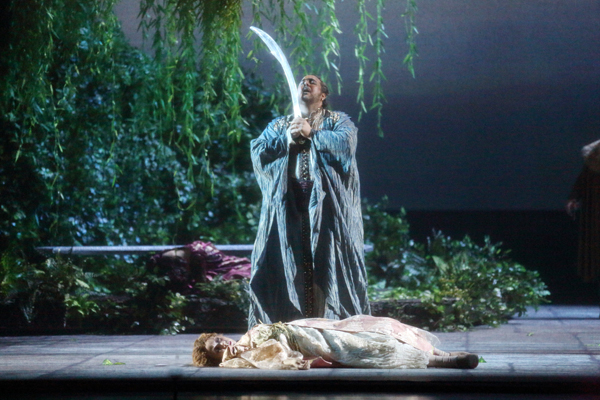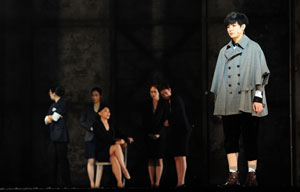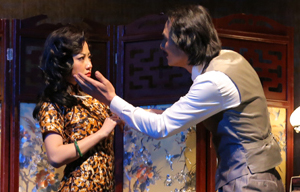
 'Taken 2' grabs movie box office crown
'Taken 2' grabs movie box office crown
 Rihanna's 'Diamonds' tops UK pop chart
Rihanna's 'Diamonds' tops UK pop chart
 Fans get look at vintage Rolling Stones
Fans get look at vintage Rolling Stones
 Celebrities attend Power of Women event
Celebrities attend Power of Women event
 Ang Lee breaks 'every rule' to make unlikely new Life of Pi film
Ang Lee breaks 'every rule' to make unlikely new Life of Pi film
 Rihanna almost thrown out of nightclub
Rihanna almost thrown out of nightclub
 'Dark Knight' wins weekend box office
'Dark Knight' wins weekend box office
 'Total Recall' stars gather in Beverly Hills
'Total Recall' stars gather in Beverly Hills
Verdi's tearjerker for the masses
Updated: 2013-04-12 15:16
By Raymond Zhou (China Daily)
|
||||||||
 |
|
Giancarlo del Monaco stages the Willow Song under a luxuriant willow tree. |
The biggest impact, both visually and emotionally, comes at the beginning of Act IV. Del Monaco stages the Willow Song under a luxuriant willow tree, which can be interpreted as either a touch of genius or a sign of insufficient imagination.
I would go for the former because so many productions of the opera simply set this act in the bedroom. The gently swinging willows are so emblematic of Desdemona's fate that it provides the perfect visual balance.
The swift scene change between the Willow Song and Ave Maria, with music uninterrupted, speaks of Del Monaco's cinematic flair and NCPA's technical wizardry.
But stagehands should take extra precaution not to make any stage noise as this is the juncture any sound of stage movements could be distracting and may jolt the audience from arguably the saddest moment in both Verdi's and Shakespeare's tragedies.
The use of two intermissions, after acts one and three, is a weird choice. A single intermission right in the middle would have done more justice to the tautness of the piece.
The set is designed by William Orlandi, with costumes by Jesus Ruiz, lighting by Vinicio Cheli and projections by Sergio Metalli.
Otello runs until April 14 and will surely come back by popular demand. Two casts in the four principal roles rotate on alternate nights.
|
|
|
|
Ambitious modernization of ancient tale hits the right notes |
For more coverage by Raymond Zhou, click here
Most Viewed
Editor's Picks

|

|

|

|

|

|
Today's Top News
Boston bombing suspect reported cornered on boat
7.0-magnitude quake hits Sichuan
Cross-talk artist helps to spread the word
'Green' awareness levels drop in Beijing
Palace Museum spruces up
First couple on Time's list of most influential
H7N9 flu transmission studied
Trading channels 'need to broaden'
US Weekly

|

|











